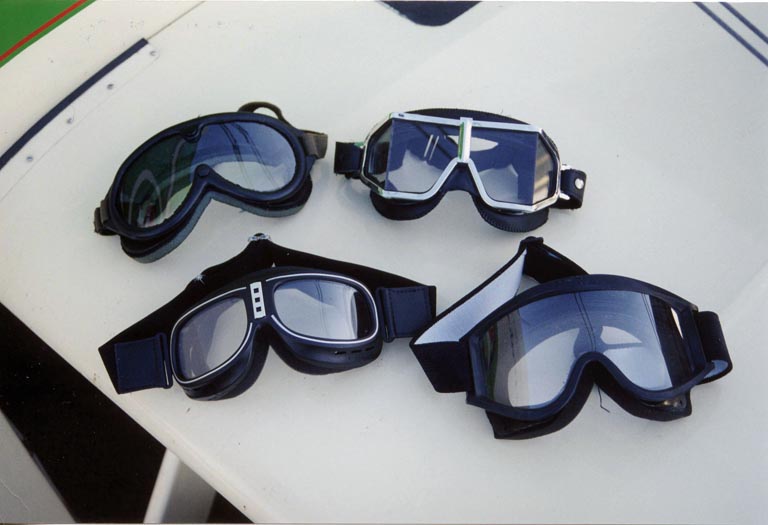Goggles for Open-Cockpit Flying
Updated Sept 2014
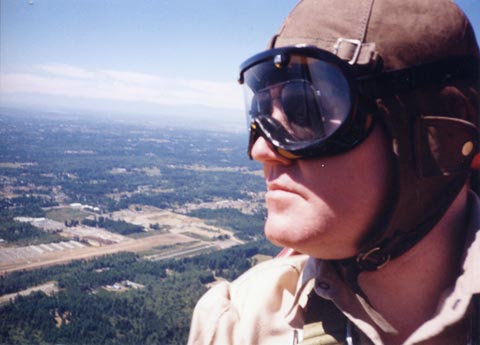
Well, I've posted about leather jackets,
I've posted about silk scarves....time
to talk about goggles.
First off, do you need them?
It really depends on how sensitive your eyes are, and how your
airplane is set up. I find it very irritating when draft
flutters my eyelashes, and my eyes seem to dry out
quickly. If you're not as sensitive (for instance, if
you wear contacts), you may not need goggles as bad.
The other factor is how your cockpit is set up, and the size and
shape of your windshield. You might not really have a lot of
draft by your head...or you might have cascades of air twirling
around your baby blues.
Most goggles have the drawback of giving you a bit of "tunnel
vision"...they tend to block your peripheral vision. It
depends a bit whether you wear normally wear glasses. Most of
the goggles I've worn give me vision slightly beyond the frame of my
glasses...where I normally can't see anything, anyway. Some
goggles still give you good peripheral vision...check out the
picture of me to the right.
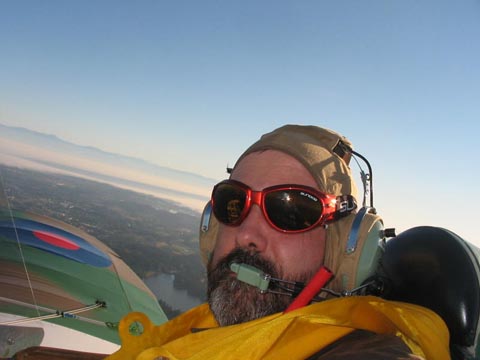
But if you don't wear glasses, normally, you can probably find some
of the bubble-type skydiver glasses or head-strap type sunglasses
designed for active sports. Here's a shot of Drew Fidoe in
"Stringbag". He says, "In my Fly Baby, my non-standard
windscreen affords excellent protection from the breeze, and I
normally fly with the goggles up, only wearing them when the
temperature drops to about freezing as my eyes tend to dry
out. I normally use a pair of tinted sport goggles in the Fly
Baby, a thoughtful posting gift from crew-mates of my last ship, as
they double as sunglasses."
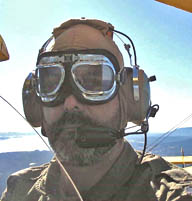 Drew is also doing some test-flying for a
Pietenpol owner. That plane doesn't have as good of wind
protection as Stringbag. "I use a pair of RAF goggles, (either
Mark VI or Mk VIII, can't remember) when flying the Pietenpol for
maximum protection'" says Drew. "I find I need them in the
Piet any time the engine is running as the pilot is quite exposed."
Drew is also doing some test-flying for a
Pietenpol owner. That plane doesn't have as good of wind
protection as Stringbag. "I use a pair of RAF goggles, (either
Mark VI or Mk VIII, can't remember) when flying the Pietenpol for
maximum protection'" says Drew. "I find I need them in the
Piet any time the engine is running as the pilot is quite exposed."
So...there's a wide variety of options.
Over the years, I've used five different types of goggles, from
varied sources, with varied results. I have three main
criteria: They have to keep the draft off my eyes, they have
to be fairly easy to put on over my glasses, and they have to look good. By
"look good," I mean, they have to be somewhat vintage in appearance.
The middle criteria is important, especially tied in with the last
one. There are sources that sell nice replica of WWII RAF
goggles. However, most historical goggles won't work with
glasses...because military pilots had to have eyesight good enough
that they didn't need glasses! So if you wear glasses, be very
careful when you buy goggles.
My Goggle History
My original set of goggles are those I'm wearing on the first
picture on this web page They met all of my criteria.
Those were ski goggles, purchased at a local sporting-goods
store. They worked pretty well. But like just about all
goggles, the lenses are made of plastic, and they tend to get
scratched over the years. The elastic was getting a bit loose,
too. When I bought Moonraker, I figured it was time to replace
the goggles.
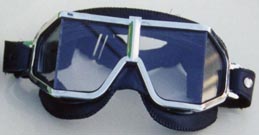
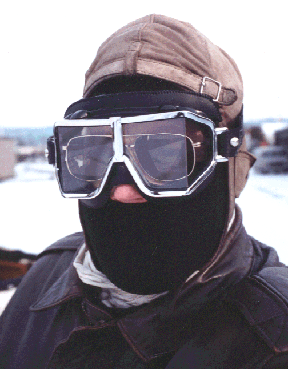 I really wanted something that had a
real, solid, military look to them. Someone suggested a
motorcycle shop, so I went by and found a pair that looked pretty
good and fit over my glasses. If I remember correctly, they
cost about $40 (mid-90s).
I really wanted something that had a
real, solid, military look to them. Someone suggested a
motorcycle shop, so I went by and found a pair that looked pretty
good and fit over my glasses. If I remember correctly, they
cost about $40 (mid-90s).
These were so-so. The air seal wasn't that good...it had a bit of
padded cloth for a seal, instead of a strip of foam
weatherstripping, and they tended to leak a bit. where the
strap attached.
I had a big of a surprise on the first (and only) time I flew at night...the "break" in the lenses
caused weird lighting affects. When my strobe fired, the
wing would light up, and the light would refract in the break and
make it look like there was another strobe close by. When I
taxied on the ground, the runway or taxiway lights in my peripheral
vision took an abrupt turn when they reached the break...a bit
distracting.
The final straw was when I showed them to a buddy. "Looks like
a SCUBA face mask," he said. I realized he was right.
They were big enough to fit my glasses comfortably, but they were
really a lot taller than military goggles had been.
So...back to the drawing board.
I had such good luck with the ski goggles the first time around that
I went back to the sporting-goods store to get another. All
they had were swoopy-looking ones in multiple colors, with the
manufacturer's names molded in bright contrast, and multicolor
headbands.
Me, I just wanted a set of plain, oval goggles.
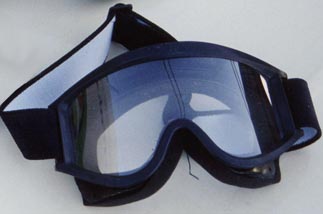 I really wanted to replace the motorcycle ones, so I
bought a mid-priced set of ski goggles (about $35). They fit
nice, but they certainly didn't meet my 'look good" criteria.
They had the manufacturer name ("SCOTT") molded in white
across the bridge (for the record, my name ISN'T "Scott"), and a
red, white, and blue strap.
I really wanted to replace the motorcycle ones, so I
bought a mid-priced set of ski goggles (about $35). They fit
nice, but they certainly didn't meet my 'look good" criteria.
They had the manufacturer name ("SCOTT") molded in white
across the bridge (for the record, my name ISN'T "Scott"), and a
red, white, and blue strap.
The strap was easy to fix..I bought some 1" elastic from the local
sewing store, plus some of the little plastic fittings to make them
adjustable.
For the name, I took a single-edge razor blade to the molded letters
and shaved them down. Really wasn't that hard to do. It
still was somewhat readable, but at least it was no longer in
glaring white across the black frame. It wasn't noticeable
unless someone was real close, and if they're that close, I've got
the goggles propped up atop my helmet, anyway.
These worked quite nicely. They sealed well, they slipped on
over my glasses easy, and the modifications brought them at least
into the "acceptable" category.
Was I satisfied? Of course not.
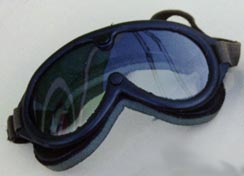 I still wanted a set of military-type
goggles. I was wandering through a military-surplus store a
few years later, and found a set of US Army "Goggles, Sun,
Wind, and Dust." The neat thing was, they seemed very similar
to the Army Air Force's B-8 goggle, one of the types our pilots wore
during WWII. See this picture of WWII P-38 pilot Ed Baquet,
for example.
I still wanted a set of military-type
goggles. I was wandering through a military-surplus store a
few years later, and found a set of US Army "Goggles, Sun,
Wind, and Dust." The neat thing was, they seemed very similar
to the Army Air Force's B-8 goggle, one of the types our pilots wore
during WWII. See this picture of WWII P-38 pilot Ed Baquet,
for example.
The price has gone up quite a bit in the last ten years, but they
still go for just $35 or so. You can find them online at
several sources, such as the US
Cavalry
Store.
They are just about perfect. They look good, they seal
well. The only drawback is that they were a bit small, and it
was a bit awkward getting them over my glasses. Yes, they are
designed to fit over glasses...MILITARY-ISSUE glasses.
My civilian-style frames were a bit bigger than what the goggles
were designed for. I eventually got a pair of sunglasses with
smaller frames just for flying, but even then they needed a bit of
fiddling when putting the glasses on.
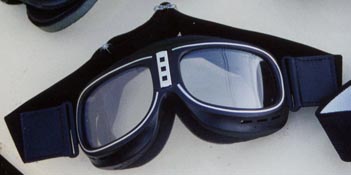 Finally, I found a goggle that meets all my
criteria: the Uvex Rallye Goggle. They look good, with a
two-lens design that fits easily over my glasses, and they seal with
no problem. The lenses are actually two pieces of plastic with
an air gap between them to reduce fogging, instead of the
light thin plastic of most goggles. They even sold replacement
lenses for them, so it's easy to restore the operation without
spending a lot of money.
Finally, I found a goggle that meets all my
criteria: the Uvex Rallye Goggle. They look good, with a
two-lens design that fits easily over my glasses, and they seal with
no problem. The lenses are actually two pieces of plastic with
an air gap between them to reduce fogging, instead of the
light thin plastic of most goggles. They even sold replacement
lenses for them, so it's easy to restore the operation without
spending a lot of money.
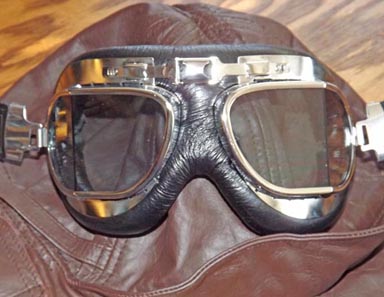 As of ~2014, though, it appears these goggles are no
longer available. Mine were over ten years old at that
point; the lenses had been replaced once, but the frames themselves
were showing some wear. I also had a new helmet that I wanted
to keep as a spare, complete with goggles. So I went goggle
shopping again.
As of ~2014, though, it appears these goggles are no
longer available. Mine were over ten years old at that
point; the lenses had been replaced once, but the frames themselves
were showing some wear. I also had a new helmet that I wanted
to keep as a spare, complete with goggles. So I went goggle
shopping again.
I'd always like the RAF Mark VIII style, and the local motorcycle
had a set of Emgo goggles that was a pretty close match.
Cheap, too, about $30. They're available in chrome and flat
black. They've got a similar style that has smooth curved
lenses rather than the angular ones on the Mark VIII.
Unfortunately, both styles put padding around both eyes
individually, which means they can't be worn over glasses.
But....geeze, they only cost $30. Why not try some
experimentation? I bought a pair of the "Red Baron" style.
Looking at the back of the goggles, the padding was in a figure-8
pattern, with a single barrier shared between the two lenses.
I put on the sunglasses I normally wear for flying (which I had done
in a small frame specifically to fit beneath goggles), donned the
goggles, and pressed down a bit. The eyeglass bows made an
imprint on the padding.
Out came the Exacto knife, and I cut away the padding where the
imprints fell. The padding on these goggles is a thin vinyl
skin with foam rubber underneath. Cutting the "skin" didn't
seem to make the skin want to continue to tear. I dug out the
foam rubber to leave a nice "trench" between the eye
pieces. I also cut notches at the outer periphery for the ends
of the eyeglass bows.
This picture shows the modifications, highlighted in yellow:
These fit over my sunglasses just fine...in fact, with the remaining
padding, are quite comfortable. Not sure how the cut areas are
going to withstand the ravages of time...I might expect the vinyl
skin to start peeling back at some point. I've considered
stabilizing them with a thin coat of RTV, but I'm afraid something
like that might make the edges of the cut padding a bit stiff and
possibly uncomfortable.
But...they're only $30, they're widely available, and I can buy a
new set every few years if I need to.
Recommendations
Are you in the market for goggles? Buy a pair of the
military-surplus ones. The odds are, they'll work for
you. I like my Rallye Goggles, but the mil-surplus ones are
just about as good. I wore my old ones on a recent flight, and
other than a bit of fiddling to get them over my glasses, they
worked great.
Style-wise, I like both the mil-surplus goggles and the Emgo
goggles. Both have the nice vintage feel, and both are pretty
cheap. Both will work with glasses/sunglasses with moderate to
small-size frames.
If you wear larger glasses when flying you can wear ski
goggles. These are widely available at sporting-goods
stores.
I've actually got a special pair of eyeglasses I wear when
flying: They're sunglasses, and I picked a smaller frame to
make them more compatible with a wider range of goggles.
Ski goggles have a big advantage: The wrap-around style has
the least impact on your peripheral vision. Another option
would be skydiver goggles; these usually have little or no frame,
and are designed to fit snugly against the face.
Or, if money is no object, you can do what a lot of the old-time
pilots did, and get prescription goggles:
http://www.prescriptiongoggles.com/
Ron Wanttaja
 Return to the Stories Page
Return to the Stories Page



 Drew is also doing some test-flying for a
Pietenpol owner. That plane doesn't have as good of wind
protection as Stringbag. "I use a pair of RAF goggles, (either
Mark VI or Mk VIII, can't remember) when flying the Pietenpol for
maximum protection'" says Drew. "I find I need them in the
Piet any time the engine is running as the pilot is quite exposed."
Drew is also doing some test-flying for a
Pietenpol owner. That plane doesn't have as good of wind
protection as Stringbag. "I use a pair of RAF goggles, (either
Mark VI or Mk VIII, can't remember) when flying the Pietenpol for
maximum protection'" says Drew. "I find I need them in the
Piet any time the engine is running as the pilot is quite exposed."
 I really wanted something that had a
real, solid, military look to them. Someone suggested a
motorcycle shop, so I went by and found a pair that looked pretty
good and fit over my glasses. If I remember correctly, they
cost about $40 (mid-90s).
I really wanted something that had a
real, solid, military look to them. Someone suggested a
motorcycle shop, so I went by and found a pair that looked pretty
good and fit over my glasses. If I remember correctly, they
cost about $40 (mid-90s). I really wanted to replace the motorcycle ones, so I
bought a mid-priced set of ski goggles (about $35). They fit
nice, but they certainly didn't meet my 'look good" criteria.
They had the manufacturer name ("SCOTT") molded in white
across the bridge (for the record, my name ISN'T "Scott"), and a
red, white, and blue strap.
I really wanted to replace the motorcycle ones, so I
bought a mid-priced set of ski goggles (about $35). They fit
nice, but they certainly didn't meet my 'look good" criteria.
They had the manufacturer name ("SCOTT") molded in white
across the bridge (for the record, my name ISN'T "Scott"), and a
red, white, and blue strap. I still wanted a set of military-type
goggles. I was wandering through a military-surplus store a
few years later, and found a set of US Army "Goggles, Sun,
Wind, and Dust." The neat thing was, they seemed very similar
to the Army Air Force's B-8 goggle, one of the types our pilots wore
during WWII. See this picture of WWII P-38 pilot Ed Baquet,
for example.
I still wanted a set of military-type
goggles. I was wandering through a military-surplus store a
few years later, and found a set of US Army "Goggles, Sun,
Wind, and Dust." The neat thing was, they seemed very similar
to the Army Air Force's B-8 goggle, one of the types our pilots wore
during WWII. See this picture of WWII P-38 pilot Ed Baquet,
for example. Finally, I found a goggle that meets all my
criteria: the Uvex Rallye Goggle. They look good, with a
two-lens design that fits easily over my glasses, and they seal with
no problem. The lenses are actually two pieces of plastic with
an air gap between them to reduce fogging, instead of the
light thin plastic of most goggles. They even sold replacement
lenses for them, so it's easy to restore the operation without
spending a lot of money.
Finally, I found a goggle that meets all my
criteria: the Uvex Rallye Goggle. They look good, with a
two-lens design that fits easily over my glasses, and they seal with
no problem. The lenses are actually two pieces of plastic with
an air gap between them to reduce fogging, instead of the
light thin plastic of most goggles. They even sold replacement
lenses for them, so it's easy to restore the operation without
spending a lot of money. As of ~2014, though, it appears these goggles are no
longer available. Mine were over ten years old at that
point; the lenses had been replaced once, but the frames themselves
were showing some wear. I also had a new helmet that I wanted
to keep as a spare, complete with goggles. So I went goggle
shopping again.
As of ~2014, though, it appears these goggles are no
longer available. Mine were over ten years old at that
point; the lenses had been replaced once, but the frames themselves
were showing some wear. I also had a new helmet that I wanted
to keep as a spare, complete with goggles. So I went goggle
shopping again.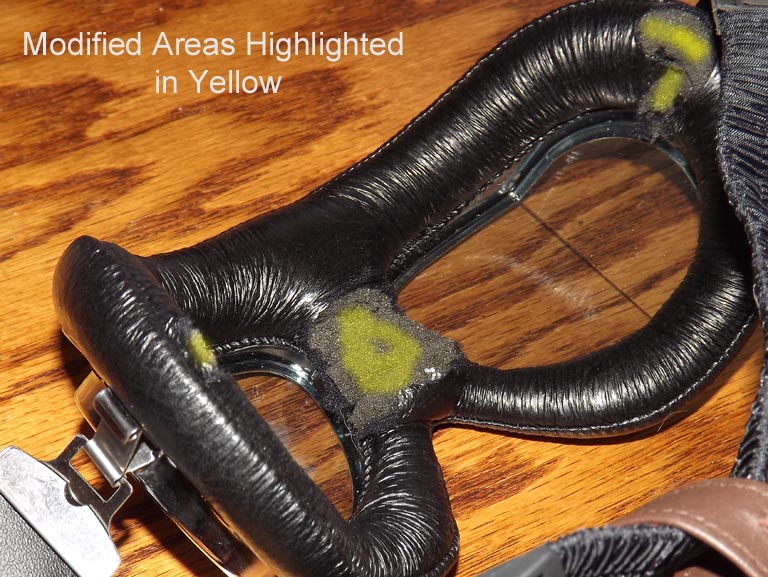
 Return to the Stories Page
Return to the Stories Page